
FIVE YEARS ago the EPO was in a state of turmoil and the Enlarged Board of Appeal got involved after important changes and a continual battle for restoration of the EPO's integrity. Unrest at the EPO is not exceptionally novel, but it does help show the systemic presence of dissent, which emanates from genuine concerns. There is often a battle within and outside the EPO; the greedy parties want to prey on and exploit the EPO, whereas the smart people inside the organisation just wish to do their job with professional integrity. Patent examiners are not to be confused with patent lawyers; in fact, patent examiners are scientists, not lawyers.
"It sure looks like Battistelli and his cronies have begun attacking the Enlarged Board of Appeal..."A new article has been published by IPKat, where one of the bloggers has been covering the EPO scandals for a while. Titled "Enlarged Board appeals - direct to the Administrative Council," the article speaks of a curious "suspension of a Board of Appeal member by the EPO President, under the guise of a "house ban" [which] has generated enormous disquiet, not only among bloggers, attorneys and EPO union officials, but now also within the Enlarged Board of Appeal."
It sure looks like Battistelli and his cronies have begun attacking the Enlarged Board of Appeal as well, having shut down some other departments whose purpose was to oversee them. It's like some kind of slow-motion coup d'état. Sooner or later there will be nobody left to topple or even investigate Battistelli. He is systemically eradicating dissent, hopefully not quickly enough to eradicate many hundreds of his staff who march against him in numerous streets in Europe.
The IPKat blogger "cannot remember any such internal EPO dispute spilling out into the public domain with such vehemence. The letter from the Enlarged Board should dispel any preconceptions that the current troubles at the EPO and the complaints about Mr Battistelli are confined to a few disgruntled examiners looking to protect their cushy jobs (a view she has heard from several quarters)."
Anyone who claims it was a grudge "confined to a few disgruntled examiners" (or anything along those lines) was either the editor of the Establishment media in Europe or someone from within Battistelli's circles. Techrights has been in contact with numerous people from the EPO (people who work at high levels too) and there is no denying that there is a massive issue. It's shocking that Battistelli still keeps his job. His dismissal or resignation should be imminent and sources tell us that he already resorts to desperate "damage control" measures.
Someone has just passed to us a copy of a new letter from the Enlarged Board of Appeal. It highlights what has been going on at the EPO and it comes from a high authority. Many people added their signatures to it. We are working to get a textual (plain text) version of it, but in the mean time we present the scanned pages below. Updates likely to follow. ⬆
Update: Here is the full letter as text.
CONFIDENTIAL
Members of the Enlarged Board of Appeal of the European Patent Office c/o Secretariat Room 206
Munich, 8 December 2014
To the Representatives of the Delegations to the Administrative Council of the European Patent Organization
And
To the External Members of the Enlarged Board of Appeal.
On December 2014, a member of the Boards of Appeal was escorted out of the Office by the Investigation Unit (0.6.1.1), a unit operating directly under the responsibility of the President. As the other members of staff wer informed by Communique 64 on the Internet on the same day, the President has imposed a "house ban" on him. It appears from this communique that the staff member is accused of having disseminated defamatory material.
A house ban may very well be considered a de facto suspension, because the Board member can no longer perform his duties.
The provisions unde which the above action has been taken, namely the Investigation Guidelines, do not - and cannot - provide a legal basis for such actions. According to Part 1, their purpose is to establish, in cases of possible misconduct, the underlying facts on the basis of which the President can come to a reasoned assessment regarding the initiation of disciplinary proceedings.
Article 95 of Service Regulations provides that if an allegation of serious misconduct is made against a permanent employee and if the misconduct alleged is of its nature incompatible with his continuing in service, the "appointing authority" may decide to suspend him forthwith.
The appointing authority for this purpose is the Administrative Council (Article 11 (3) EPC). The President may propose such a disciplinary measure to the Administrative Council (Article 10(2)(h) EPC). It is however the Administrative Council as the disciplinary authority who has to decide on it (Article 11(4) EPC).
This specific distribution of roles is part of the concept of separation of powers and the independence of the Board of members as enshrined in Article 23 EPC. However, in the present case, the President decided in lieu of the Administrative Council, for which no provision appears to exist.
To this is added the fact that his computer was confiscated by the investigation unit, which has given them access to possibly confidential information regarding the preparation and deliberation of cases by the member's board, without proper legally sound guarantees.
The undersigned members of the Enlarged Board of Appeal are deeply concerned about this conduct which could affect the validity of the whole proceedings if the results of the enquiry were in fact to lead to disciplinary proceedings. They are aware that independence does not imply impunity.
The actions of the investigation unit on the orders of the President also appear to be a clear challenge to the judicial independence of the Boards of Appeal.
It is therefore urgently requested that the Administrative Council in its capacity as appointing and disciplinary authority ensures the independence of the Boards of Appeal, one of the pillars of the European patent system. What is needed is a clear limitation on the executive power, as far as the Boards of Appeal are concerned, in situations like the present, so as to avoid any impression of undue influence on their judicial work, contrary to the independence requirements of Article 6 of the European Convention on Human Rights.
Yours sincerely, Gabriele Alt Graham Ashley Gianni Assi Ingo Beckedorf Fritz Blumer Tamas Bokor Brnhard Czech Albert de Vires Eugene Dufrasne Franz Edilinger Gunnar Eiasson Kevin Garnett Pascal Gryozka Andre Klein Thomas Kriner Albert Linder Hugo Meinders Rainer Moufang Ulrich Oswald Michael Poock Giovanni Pricolo Gaston Raths Joseph Riolo Marco Ruggiu Werner Sieber Fred van der Voort Bianca ter Laan Claude Vallet Martin Vogel Gerard Weiss Stefan Wibergh Manfred Wieser Michael Harrison Marie-Bernadette Tardo-Dino Wolfgang Seretaruk
cc Mr. Benoit Battistelli annex: Circular 342 with the Investigation Guidelines
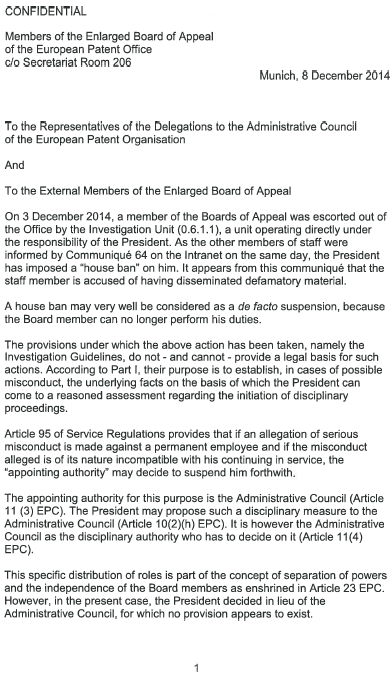

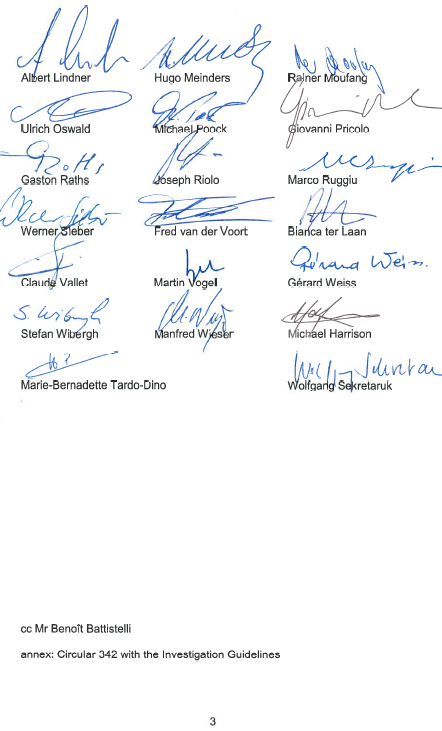
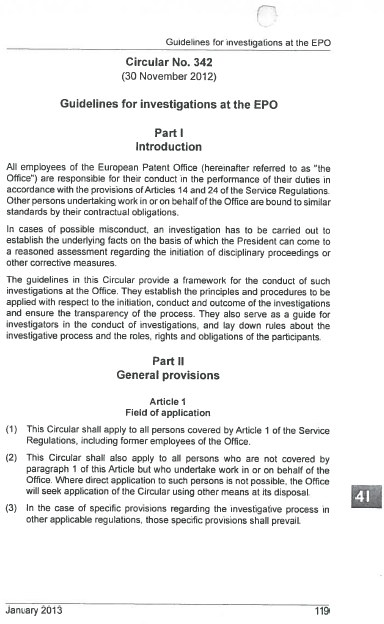
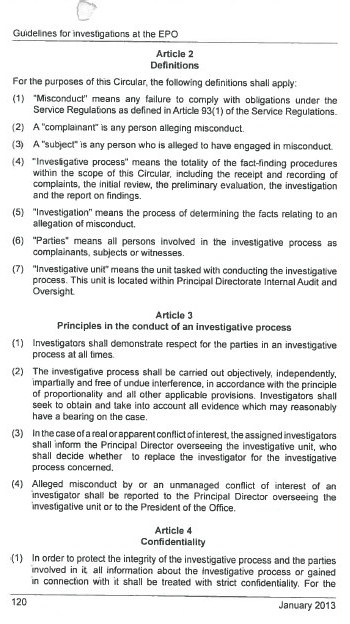
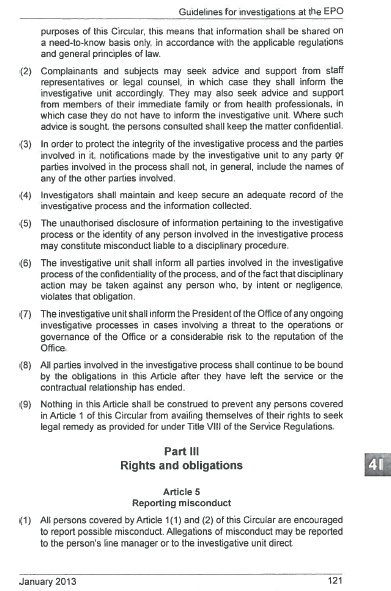
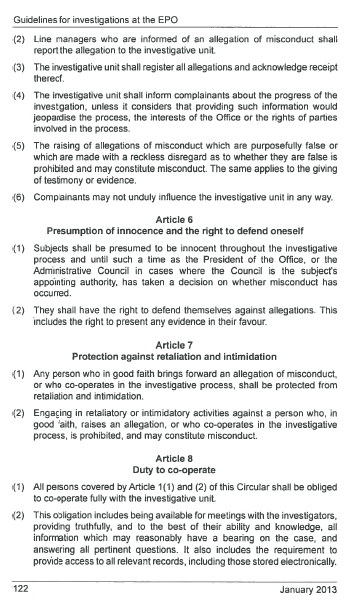
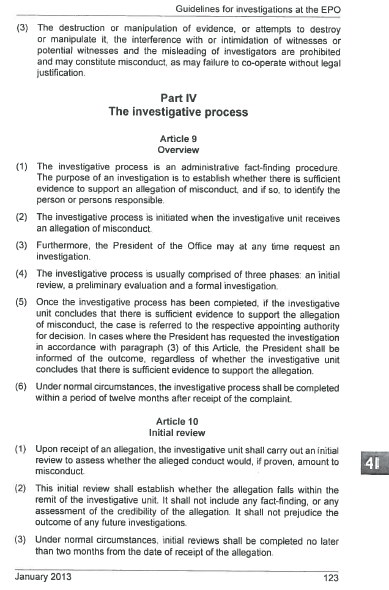
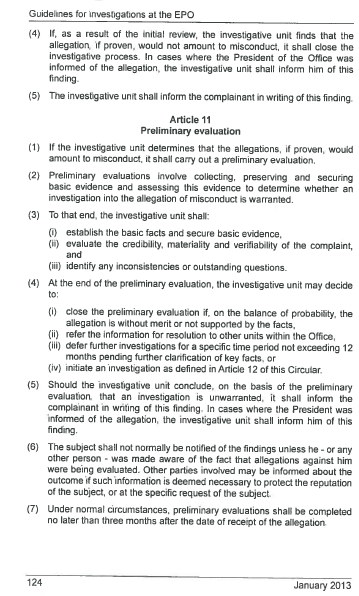
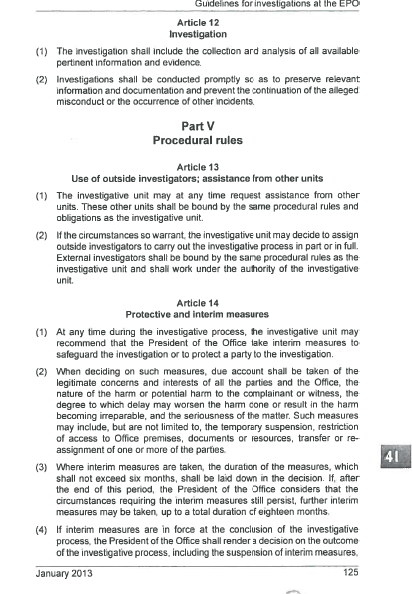
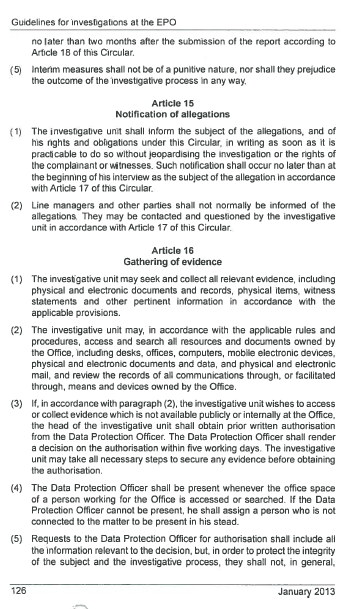
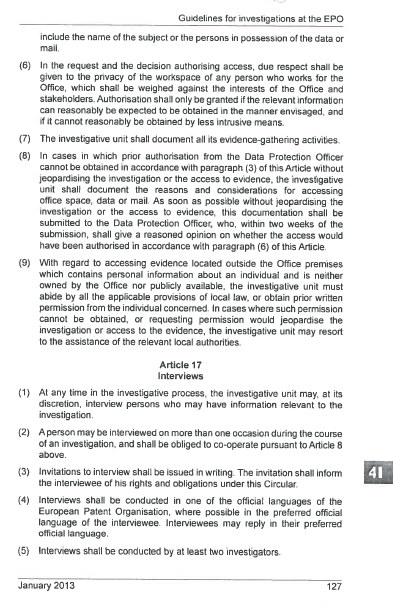
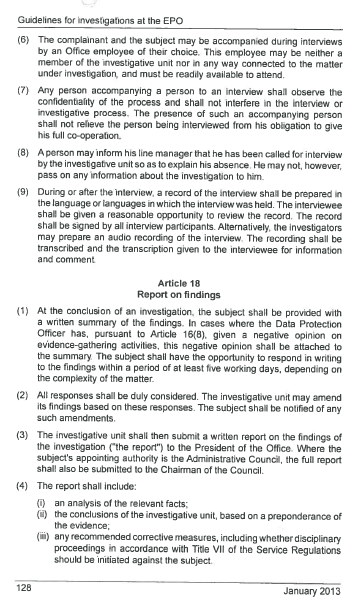
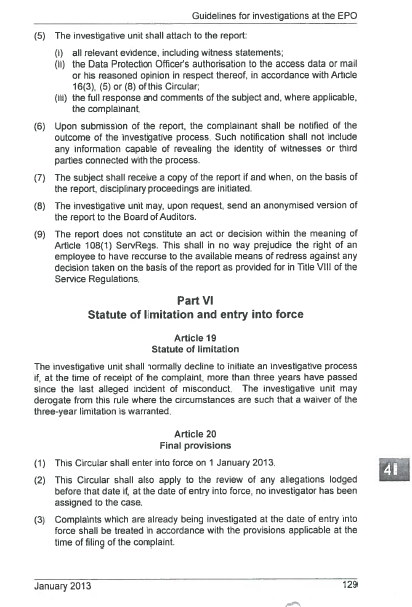
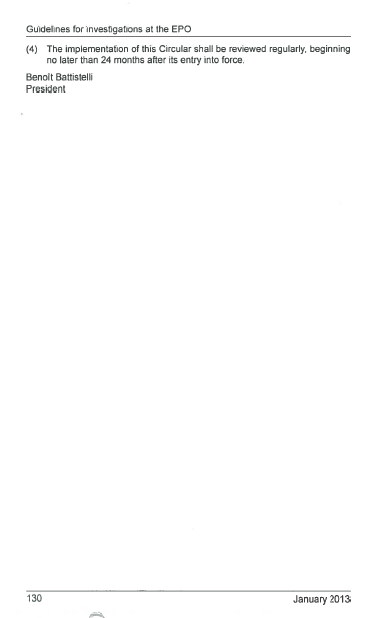
Comments
katkatkat
2014-12-11 07:56:24